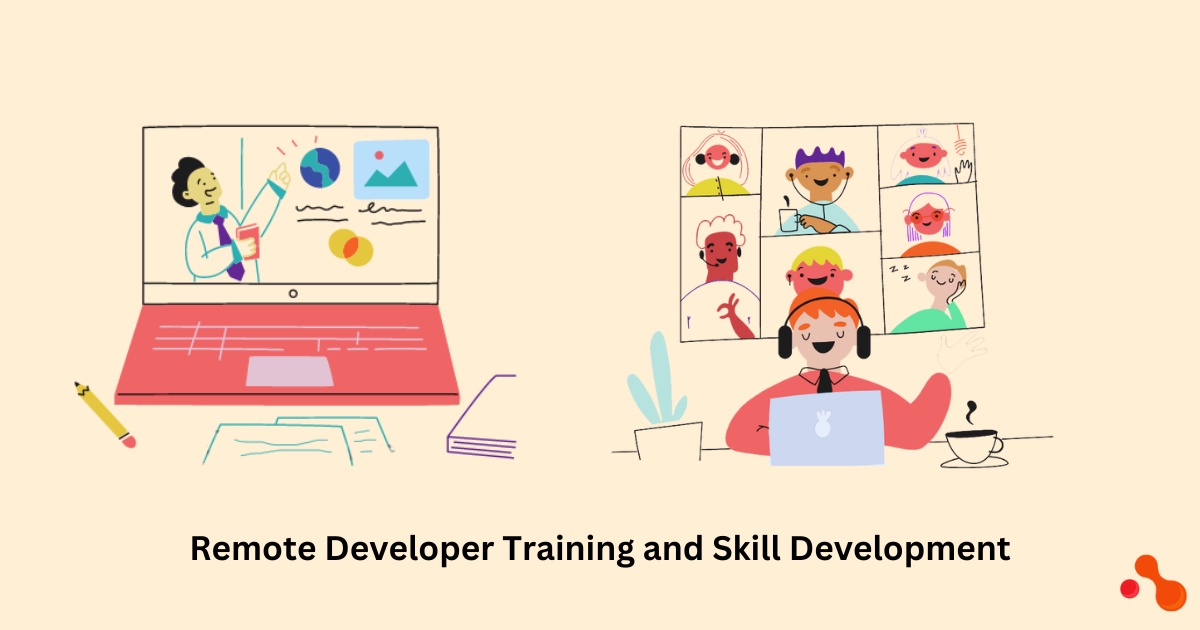Introduction
In today's digital era, the demand for skilled developers is skyrocketing. As a result, companies are increasingly turning to remote hiring to access a larger talent pool and expand their development teams. However, hiring remote developers is more than finding the right candidates; investing in their training and skill development is also crucial. This blog post will explore the importance of remote developer training, its benefits, and how it empowers growth and continuous learning for developers and organizations.
The Need for Continuous Learning
The software development industry is known for its dynamic nature, constantly evolving with new technologies and trends. As a result, professionals in this field must embrace continuous learning to stay relevant and competitive in the job market. In this section, we will explore the challenges developers face in balancing work and learning and how remote training can help overcome these challenges.
- Dynamic nature of the software development industry:
- Software development is rapidly evolving, with new programming languages, frameworks, and tools frequently emerging.
- Developers must adapt and learn new skills to keep up with the latest trends and remain competitive.
- With continuous learning, developers can stay updated and more desirable to employers.
- Staying relevant and competitive in the job market:
- Employers value professionals committed to learning and professional growth in today's competitive job market.
- Continuous learning allows developers to enhance their skills, expand their knowledge, and increase their value in the eyes of potential employers.
- Regularly updating their skill set ensures developers can tackle new challenges and take advantage of emerging opportunities.
- Challenges in balancing work and learning:
- Developers often face time constraints due to demanding work schedules and project deadlines.
- Balancing work commitments with the time required for learning can be challenging.
- Finding dedicated time for learning can be especially difficult for remote developers with fewer structured learning opportunities.
- Benefits of remote training in overcoming these challenges:
- Remote training offers flexibility in time and location, allowing developers to learn at their own pace and schedule.
- Developers can access a wide range of online courses, tutorials, and resources, enabling them to learn new skills remotely.
- Remote training eliminates the need for physical travel to attend workshops or training programs, saving time and costs.
- Example: A remote developer can use online coding bootcamps or webinars to learn new programming languages or frameworks, even while working on a project.
Continuous learning is crucial for software developers to stay relevant and competitive in the dynamic industry. Despite the challenges of balancing work and learning, remote training provides an effective solution by offering flexibility and access to diverse learning resources. Remote developers can leverage these opportunities to enhance their skills, expand their knowledge, and increase their value in the job market.
Advantages of Remote Developer Training
Remote developer training refers to training software developers through online platforms and resources instead of traditional classroom-based training. This approach offers numerous advantages, making it a preferred choice for many individuals and organizations. Let's explore some of the key benefits in an easy-to-understand format using bullet points and examples:
- Flexibility:
- Remote developer training provides flexibility in terms of time and location. Developers can access training materials and resources anywhere and at any time.
- For example, a full-time developer can take advantage of remote training during evenings or weekends without sacrificing job commitments.
- Accessibility:
- Remote training offers accessibility to individuals who may not have access to traditional classroom-based training due to geographic constraints or other limitations.
- It allows developers worldwide to access high-quality training resources and connect with industry experts, regardless of their physical location.
- Cost-effectiveness:
- Remote developer training is more cost-effective compared to traditional classroom-based training.
- Organizations can save on travel, accommodation, and venue rentals.
- Developers can also save on commuting costs and reduce the overall cost of training materials.
- Convenience and self-paced learning:
- Remote training offers convenience and self-paced learning options, allowing developers to learn quickly and conveniently.
- Developers can revisit training materials, pause and resume their learning progress, and focus on areas that require more attention.
- For example, developers can watch video tutorials multiple times until they fully grasp a particular concept.
- Wide range of online resources and platforms:
- Remote developer training provides access to many online resources and platforms.
- Developers can explore interactive tutorials, coding exercises, forums, and communities that foster collaboration and knowledge sharing.
- They can also access online courses from renowned educational institutions or specialized platforms like Udemy, Coursera, or Codecademy.
Remote developer training offers a flexible, accessible, and cost-effective way for individuals and organizations to enhance their software development skills. It provides the convenience of self-paced learning and grants access to various online resources and platforms. Whether you are looking to hire remote developers or enhance your software development capabilities, remote training presents a valuable opportunity for growth and learning.
Effective Strategies for Remote Skill Development
In today's digital age, remote skill development has become crucial for professionals in various fields, including software development. Whether you are a remote developer or an employer looking to hire remote developers, implementing effective strategies for skill development is essential. Here are some key strategies to consider:
- Self-paced learning:
- Take advantage of online tutorials, documentation, and video courses that provide flexible learning options.
- Explore platforms like Coursera, Udemy, and Codecademy, which offer various courses on programming languages, frameworks, and development tools.
- Break complex concepts into smaller, manageable tasks to enhance understanding and retention.
- Collaboration in projects and participation in coding communities:
- Engage in collaborative projects with fellow developers to gain practical experience and improve problem-solving skills.
- Join coding communities and forums like GitHub and Stack Overflow to interact with experienced developers, seek advice, and learn from their expertise.
- Contribute to open-source projects to showcase your skills, collaborate with others, and receive valuable feedback.
- Virtual conferences, webinars, and workshops for industry trends:
- Attend virtual conferences, webinars, and workshops to stay updated on industry trends, best practices, and emerging technologies.
- Take advantage of online platforms like Zoom, Microsoft Teams, or Google Meet to participate in live sessions, ask questions, and network with industry professionals.
- Leverage resources like YouTube and podcasts to access recorded sessions from industry experts.
- Setting goals, time management, and discipline:
- Define clear goals for skill development, such as learning a new programming language or mastering a specific framework.
- Break down your goals into smaller milestones and create a schedule to allocate dedicated time for learning and practice.
- Practice effective time management techniques, such as the Pomodoro Technique, to maintain focus and maximize productivity.
- Cultivate discipline by setting aside distractions, creating a conducive learning environment, and following a consistent routine.
Remember, remote skill development requires self-motivation and perseverance. By leveraging self-paced learning, collaborating with peers, staying updated with industry trends, and practicing effective time management, you can enhance your skills as a remote developer or make informed decisions when hire remote developers.
Overcoming Challenges in Remote Developer Training
Developing a team of skilled software developers is crucial for any organization, and with the rise of remote work, hire remote developers has become more common. However, remote developer training comes with its own set of challenges. This section will explore some common challenges and effective strategies to overcome them, ensuring successful training for remote developers.
Common Challenges:
- Self-motivation: Remote developers may struggle with staying motivated and focused without the structure of a traditional office environment.
- Example: With colleagues nearby, it can be easier to maintain productivity and enthusiasm throughout the day.
- Distractions: Working remotely exposes developers to various distractions, such as household chores, family members, or personal devices.
- Example: It's easy to get sidetracked by social media notifications or household responsibilities, leading to decreased productivity.
- Lack of accountability: Remote developers might feel more accountable with direct supervision, leading to potential slacking or missed deadlines.
- Example: The absence of a physical presence can sometimes result in a lack of urgency and reduced productivity.
Strategies to Overcome Challenges:
- Structured learning environment: Establishing a structured environment helps remote developers stay on track.
- Example: Creating a daily or weekly schedule with dedicated learning and working hours can provide a sense of routine and help maintain focus.
- Peer support: Encouraging remote developers to connect with their peers for support and collaboration can foster motivation and accountability.
- Example: Setting up virtual discussion groups or Slack channels where developers can share challenges, seek advice, and celebrate achievements can create a sense of community.
- Finding mentors through online platforms and communities: Remote developers can benefit from mentors who can guide and motivate them in their learning journey.
- Example: Online platforms like LinkedIn, GitHub, or dedicated developer communities offer opportunities to connect with experienced professionals willing to provide guidance and support.
- Importance of feedback and continuous improvement: Regular feedback is vital for remote developers to track their progress and identify areas for improvement.
- Example: Conducting weekly or biweekly virtual meetings to provide feedback on completed tasks and offer suggestions for growth can help remote developers stay motivated and focused.
Conclusion
In conclusion, hire remote developers training and skill development have proven to be powerful tools for empowering growth and continuous learning. Overall, embracing remote developer training and skill development is crucial for businesses to thrive in the digital age and foster a culture of growth and innovation. By investing in these opportunities, companies can unlock the potential of talented developers and drive long-term success.


No comments yet